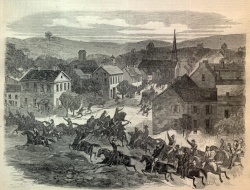|
Understanding how American democracy developed requires knowing a few interesting pieces of American history as they relate to how they shaped the beliefs and attitudes of Americans. Civicwiki does not exist as a history website, but it must take notice of historical elements to make its case for a more civic society.
Articles in this category, among other things, deal with these elements of America's heritage.
1600 to 1763
Sample of relevant topics:
- The factors that induced the colonists to move from civilization in England and Europe to America, wilderness and hardship at enormous personal cost?
- The efforts on the part of those who obtained patents, charters, grants of land, and formed companies to colonize America were driven by motives of commerce and personal gain. Such ambitions were ever present and influential.
- The emigrants themselves - the colonists - were moved by a variety of motives
- Theysought land and plantations for themselves.
- Some had religious motives.
- Some were sent as alternatives to prison or other punishment.
- The conditions colonial settlers encountered produced statistics that are surprising today.
- The toll in terms of health, welfare and life was staggering. Yet they continued to come.
- English colonists brought a set of political expectations with them.
- Political expectations could be read in the charters that created the colonies and the degree of self government given to the colonists and their leaders.
- It meant something to be English. In the first Virginia Charter of 1606 the king declared that all Englishmen residing on English soil - wherever that may be - were to enjoy the same rights as Englishmen at home. This was something new in colonization and differed markedly from the approaches of other European colonizing powers such as Spain and France.
- Their English heritage defined the colonists view of the rights of man. Some colonial charters called for local representative government, but representative government happened in spite of charter direction. We hope to capture this in articles about:
- Our Common Law Heritage
- Virginia and its charters
- Maryland
- New England and its charters
- Other colonies and charters
- It was a religious age. Religion was part of daily life and part of the language. Moreover, both government and society placed importance on uniformity of religion, but there was very little actual uniformity to be found. This caused, on the other hand, a great deal of religious intolerance.
- Religious intolerance at home was behind the decision of many settlers to emigrate, but tolerance was not their intent. Tolerance did evolve in the colonies; but almost every colony, when founded, sought to establish a church and form of worship defined by the leaders of the colonies and that would be uniform among their settlers.
- The estrangement from England.
- The colonists liked being English subjects. It was the foundation of a degree of freedom unmatched by the subjects of other European countries and it associated them with the most successful commercial and military power in Europe.
- The failure of king and Parliament in the 17th century to understand the mood and attitudes of their English colonies was reflected in the laws they passed that sought to tax and regulate commerce and life in the colonies. These acts guaranteed that America would eventually seek independence.
1763 to 1800
1763 was a turning point.
There is no limitation intended on the time period to which articles in this category should belong. However, the time period from the end of hostilities between England and France in 1763 and the ratification of America's Constitution belongs to American Independence and Federalism and Democracy.
Sample of relevant topics:
- The English no longer turn a blind eye (but seek to enforce former Acts as well as the more restrictive new ones)
- A few key acts of Parliament
- The King and his advisors are over their head (they completely misjudge the colonists and their needs)
- Independence was off the table until July 1776 (for the large majority)
- The founders were scholars - and America their fortunate beneficiary.
- Equality of Condition among Americans
After 1800
This portal is the place to assign categories and pages that present and discuss the elements of America's heritage that shaped the United States.
|

Morgan's Raiders entering Washington, Ohio in August, 1863
This Civil War image is a placeholder.
|
